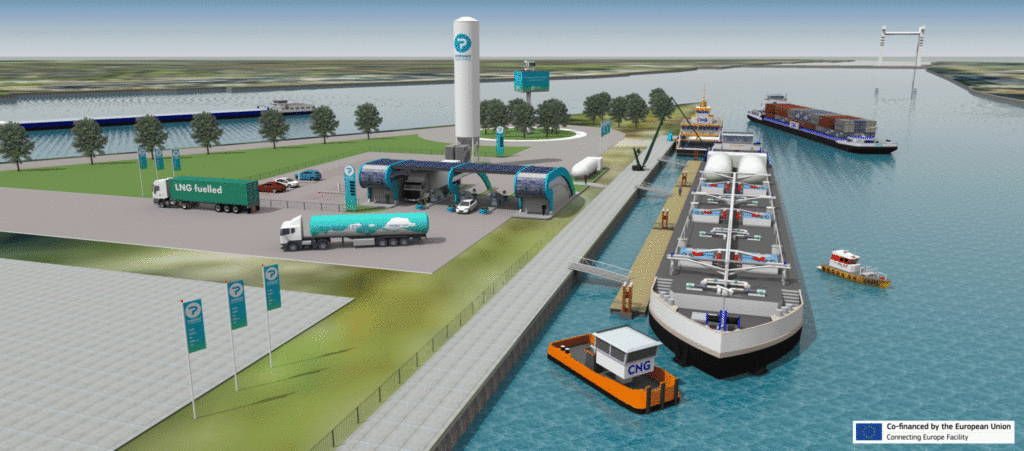The growing role of sustainability
As a competitive advantage for ports
11-05-2017European ports are busy hubs for the transportation of products from all over the world; at least 99 percent of all consumer goods are shipped by container. Ports in Europe are to a large extent the engines of their national economies. Unfortunately, there is a major downside to shipping. The ships themselves and the logistics around ports cause air pollution. This damages both the environment and the health of inhabitants of port cities.
DISTORTED IMAGE
Although shipping is usually regarded as a relatively environmentally-friendly form of transportation, it is not as harmless as it appears. Traditional ships that run on fossil fuels emit high concentrations of air-polluting chemicals. Because vessels have an average lifespan of more than 25 years, the applied technology is often not modernised. This causes large amounts of nitrous oxides (NOx) and particulate manner (PM) that are being emitted.
The limit to the amount of sulphur dioxide (SO2) that ships are allowed to emit is 3500 times higher than the limit for diesel in road transport. This causes the shipping industry to have by far the largest emission of SO2. Furthermore, the shipping industry is responsible for 2 to 3 procent of the worldwide emission of CO2.
NOx and particular matter from ship emissions are linked to premature death by lung cancer and heart diseases. People that are living or working in coastal and port areas are particularly at risk. To reduce this risk, ship emissions should be reduced.
It is clear that much can be achieved by cleaner shipping, yet very little is happening in this regard. While the public and private sector have been working for years to reduce the CO2 emissions of road transport, there are hardly any similar attempts to achieve clean shipping.
CLEAN AIR STARTS WITH CLEAN FUEL
To reduce the pollution that shipping causes, various measures can be taken. To reduce their emissions, ships can use after-treatment technologies and modify their engines. There is, however, a better, more efficient solution to improving local air quality by avoiding NOx and soot emissions: alternative fuels. Using clean fuels, such as CNG and LNG, could reduce local air pollution caused by ships by nearly 75 percent and also leads to a significant reduction of CO2 emissions. Furthermore, LNG does not contain sulphur which prevents acid rain
A SIMPLE SOLUTION FOR EVERY TYPE OF SHIP
The use of CNG and LNG is highly suitable for both maritime and road transport. Ships and traffic in urban port areas could benefit from the cities’ infrastructure. Making the infrastructure for fuels more sustainable would thus also ensure more sustainable maritime transport and cleaner air.
Depending on the type of ship, there is a clean fuel available that can replace maritime fossil fuels. CNG can be used for ships that sail a fixed route within urban ports. LNG is a cleaner alternative for deep sea, inland shipping and long-distance road traffic. By building fixed green-fuel refuelling points, ferries and vehicles can be connected. This infrastructure can also be used for local applications such as lift trucks and trucks that carry seacontainers. An LNG infrastructure can also produce LCNG (high caloric CNG) from LNG. On this type CNG smaller trucks, ships and passenger transport can drive. This means the port as well as all the logisitics around the port can become less polluting at once.
Switching to alternative fuels in ports is beneficial to the health of the population of port cities and the environment. Furthermore it also has a commercial potential. For certain types of ships, the total cost of ownership (TCO, all the costs involved in using a product) of LNG or CNG is comparable to the TCO of diesel. Moreover, the capital costs for the infrastructure of CNG are considerably reduced if it is made simultaneously available for ships and local traffic. Local port, ferry and taxi companies could use the same infrastructure. An LNG station could supply fuel to ships as well as to trucks having to transport cargos further inland.
As an independent supplier and advisor of clean fuels, PitPoint is a frontrunner when it comes to supplying clean fuels such LNG. With over 10 years of expertise, we can offer a variety of possibilities to organisations that want to go greener. As a system integrator, PitPoint has created infrastructures for CNG, LNG, electric and hydrogen fuel for organisations in the public and private domain such as shipping companies and ports.
The pressure on ports to become more sustainable is increasing. We foresee that sustainability will play an important role in competition between ports in the future. Several ports are already connecting to clean fuels. In order to remain competitive, ports such as Rotterdam, Antwerp and Hamburg will have to implement sustainable solutions throughout their entire logistic chains.
